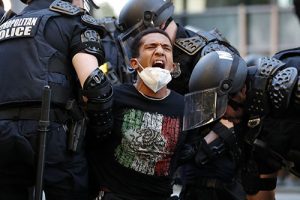The COVID-19 pandemic has exposed the systemic white supremacy and the American establishment’s racism, prejudice and discrimination against people of colour, which resulted in global protests. However, there has been no concerted effort to expose the structural racism of US foreign policy, which is primarily driven by capitalist interests. A recent article in The Nation, one of America’s oldest publications, suggests that “the US government learned to use violence and military force to make white people secure in their positions of privilege and domination” through its brutal history of genocide and slavery.
When the civil rights movement started to take shape in the US, sub-Saharan African nations were also reclaiming independence. The American officials immediately “labelled segregation and racism as threats to US foreign policy.” President Eisenhower’s Secretary of State, John Foster Dulles, is on record saying, “the situation in Little Rock, Arkansas is ruining our foreign policy. The effect of this in Asia and Africa will be worse for us than Hungary was for the Russians.”
Racism, veiled in the self-proclaimed American “exceptionalism,” posits that the US is the singular model for good in the world. By positioning itself as unique the US feels it is exempted from all international laws and norms and demands that other nations follow it. At its core, the US “national security” tenet assumes that the lives of white Americans are more valuable than those of others and that “we can make ourselves more secure by making them less secure.”

The logical extension of this exceptional thinking entitles the US to kill or subdue those who disobey its orders. It has resulted in US bombings and assassinations of people of colour worldwide by criminalising them as “terrorists” or otherwise defining them as the dangerous “others.” The Pentagon enjoys an unconscionable budget, a far-reaching network of military bases, and a system that gives sole authority to the US President to decide whether to annihilate the planet.
Afghanistan is the most recent example of the US’, racist foreign policy.
The US has lost its credibility to act as the role model state for human rights, individual freedoms, and democratic governance. Its image has been challenged by videos of militarised police forces and armoured vehicles taking to the US streets, of peaceful protesters being met with rubber bullets, tear-gas and batons. Senior American officials in the legislative and executive branches have openly called to “send in the troops” and “dominate the battlespace,” by which they mean the public square of towns and cities across the US, where citizens exercise their right to assemble and protest.
Ignoring the most significant existential threats of climate change, nuclear catastrophe and pandemics, Washington sees the primary threats to US security as militaristic in nature and emanating from outside US borders.
Undoubtedly, US foreign policy has destabilised and robbed the world of the resources needed to achieve human development, human security, human rights, and human dignity.
To make the world a safer place, the US will have to eschew the policy of global dominance and, instead, pursue a strategy of international solidarity.
They must reject the notion that there is a hierarchy of human value in which some lives are worth more than others and the myth that violence is a necessary and effective means for achieving political ends. They should not conduct military aggression in our name, impose devastating economic sanctions, squander public resources on exorbitant Pentagon budgets, criminalise refugees and migrants, or threaten to use nuclear weapons.
A more ethical, practical, and peaceful approach to the world begins with acknowledging, apologising, and making amends for the genocide of the Native American peoples and the enslavement of Africans over many generations. It requires the termination of current US wars, including those conducted through drones, airstrikes, and targeted assassinations, and the revocation of their open-ended authorisations. It involves reducing the size of the Pentagon budget significantly and paring back the global network of US military bases that serve as springboards for aggression.
The United States must sign, ratify, and comply with all significant treaties and agreements, especially those that prohibit nuclear weapons, eliminate discrimination against women, protect children’s rights, set legal frameworks for the use of the world’s oceans, and establish the International Criminal Court.



